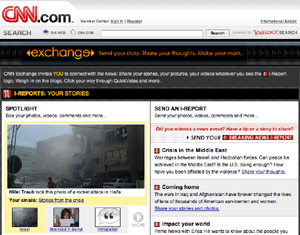Two quick thoughts: A look at Chinese television [zh] from Southern Metropolis Daily columnist and Lian Yue's Eighth Continent blogger Lian Yue (连岳) dated August 5:
作为权力玩物的电视台
TV Station as Plaything of Power
中国可能是世界上电视台最多的国家之一,同时观众选择权也是最少的,拿着遥控器巡一遍(如果你这么无聊的话),就会发现千台一面,都一样的惨不忍睹,同时你还会知道,除了中央电视台这样少数几个富得流油的电视台之外,多数电视台看起来日子并不好过,因为它们几乎都播同样的虚假广告,丰胸增高,不育不孕,矮子可以增高,肥婆轻易变瘦,凡是有点脑子的人,都不会相信这样的广告,它们造成的感官污染几乎让所有人深恶痛绝,可是它们被广电总局一禁播,有电视台就减了百分之六十的收入(据《新京报》8月3日新闻)——这说明过于泛滥低劣的电视台主要依靠骗术生存,在法律框架内几乎没有任何商业价值,注定是个赔本的货色,但是这不妨碍所有电视都坚强地存在着,并且电视台还会越来越多,再过几年,也许乡一级电视台可以也会普及起来,它们不可能靠财政养着,又没有正规厂商愿意投入广告,与骗子合流是唯一的出路,所以广电总局的禁令我个人并不看好,被禁的五类广告风头一过,迅速复活是可以预期的。
China must just be one of the countries with the most televistion stations in the world, and at the same time has an audience with the least choice. Just take the remote control and flip through (if you find yourself so bored) and you will find a thousand channels with the same face, similar to the point of unbearable. At the same time you will learn that except for the minority of greasy-rich channels like
CCTV, the majority don't seem to be doing so well, because they all seem to be airing the same vapid commercials: breast enlargement, infertile? sterile?, how midgets increase height, fat wives get thin quick and easy. Nobody with half a brain believes these commercials; their pollution of the senses leads almost everyone to despise them. But the second that
SARFT bans them from the air, the stations lose sixty percent of their revenue (according to the August 3 issue of
The Beijing News). This just goes to show that far too many cruddy televistion stations rely mainly on trickery for existence, and from a legal standpoint have almost no commercial value, are doomed be money-losing rubbish. But this doesn't stop television from existing; in fact the number of television stations continues to grow. In a few years, rural-level television stations might even become more common. There's no way they'll survive off public funding, though, and as no normal manufacturers will be willing to invest in advertisements, business with fraudsters is the only road left. That's why I'm not in favor of SARFT's ban. As soon as
the ban on these five kinds of advertisements blows over, it's expected they'll be back soon enough.
And a look at American television from Technology, Media and Telecom commentator at MindMeters, journalist-blogger Lin Jiashu (林嘉澍):
CNN+YouTube=?
时代华纳集团旗下的有线电视网CNN在周一推出了“草根新闻”站点CNN Exchange。在首页上,有几行醒目的标语:“CNN Exchange邀请你与新闻相连:无论在何处看到I-Report的标志,即请分享你的故事、你的图片、你的新闻”,“见证了一次新闻事件,或者有心得体验与人分享?请发送你的突发新闻I-Report”。如果将“I”译作“我”,那么个人视角显然是这个栏目的重点。按照Cnet的说法,这个创意应该是受到了YouTube的启发。本月初,CNN在报道黎巴嫩冲突时播放了YouTube上的视频片段。这支视频现在已经被观看了36万次,拥有3600多条评论。而这类来自战地居民的作品,无疑拥有比CNN记者更具原生态的视角和不可替代性。
On Monday, under the banner of Time-Warner Group, cable television network CNN released its “grassroot news” site
CNN Exchange. On the front page are several lines of eye-catching keywords: “CNN Exchange invites you to connect with the news: Share your stories, your pictures, your videos wherever you see the I-Report logo.” “Did you witness a news event? Have a tip or story to share? Send your breaking news to I-Report.” If you turn the ‘I’ into ‘我’ [Chinese for ‘I’], then it appears that personal views are the focus of this column.

According to CNET, this innovation was probably inspired by YouTube. At the beginning of this month, in covering the conflict in Lebanon, CNN broadcast segments of video from YouTube. This clip of video has now been viewed over 360,000 times, with over 3600 comments. Work originating in a warzone like this undoubtedly possesses a much more natural and irreplaceable angle than any CNN journalist.
在全球的传统媒体品牌中,时代华纳算是最容易让人联想到互联网的一家。2000年,他们和如日中天的美国在线完成了价值千亿美元的并购,市场价值一度高达2900亿美元。时至今日,他们的市值仅剩下当时的1/4不到。在首轮互联网泡沫全面破灭之后,策划并购案的美国在线已经被从公司名称中剔除出去。相比六年前的大手笔,时代华纳最近一系列拥抱新媒体的举措只能算是小动作。除去CNN Exchange,美国在线也计划推出一个视频站点,希望用新媒体的广告收入逐步取代日渐势微的互联网接入业务。美国在线的计划让传统电视媒体拥有了新的内容发布渠道,而CNN Exchange则在视频内容的制作方式上做出了实质性的改变。如果说2000年的并购案更像暴发户的盲目挥霍,那这些细小的转变则是环境成熟后的稳步拓张。
Of the traditional global media brands, Time-Warner counts as one of the easiest to associate with the internet. In 2000, they completed a merger with top-of-its-game AOL worth USD 100 billion, and their market value instantly shot up to USD 290 billion. As of today, their market value is less than a quarter of what it was then. After the burst of the first internet bubble, the planned merger with AOL was struck out from the company name. As with [Chinese software company] Dashoubi six years ago, the recent series of Time-Warner's moves toward embracing new media will only amount to little. Aside from CNN Exchange, AOL also plans to put out a video site, hoping to use the advertising revenue from new media to gradually replace their declining internet operations. AOL's plans give traditional television media a new avenue by which to broadcast content, and CNN Exchange significantly alters the way video content is produced. If you say the 2000 merger resembles the blind spending of [China's] nouveau riche, then these tiny changes are the steady developments of a matured environment.







